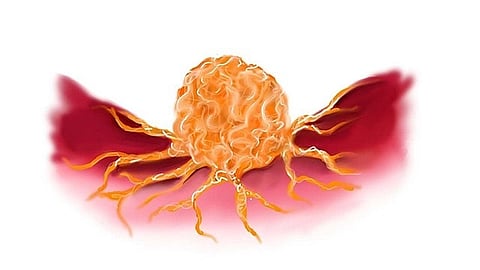

The second tallest man in UP, Seeraj Kumar, who was over seven feet tall, underwent surgery to remove a tumor last week. The procedure was carried out at the Ram Manohar Lohia Institute of Medical Sciences, UP, by the neurosurgical team. The tumor, which was latent throughout Seeraj's childhood, started to show symptoms in early adulthood. The tumor of the pituitary had grown almost to triple its normal size over the years. This caused the tumor to start to compress the nearby neural structures, which led to the development of the symptom of blurring of vision. In addition, Mr. Kumar experienced other symptoms like headaches and fatigue.
The pituitary gland is the structure responsible for the production of multiple hormones that regulate various functions in the human body. Growth hormone is one of the important hormones responsible for controlling the growth and development of an individual. Growth hormone overproduction can result in two conditions, namely acromegaly and gigantism (1). Gigantism, which is marked by tall stature, arises as growth hormone overproduction takes place before the union of the epiphysis of long bones. Acromegaly is a condition marked by enormous extremities and a distinctive facial feature caused by GH hypersecretion following epiphysis fusion (2).
The neurosurgical team at the RMLIMS diagnosed the tumor and removed it last week using a minimally invasive technique performed with an endoscope introduced through the nose. The surgery was successful, and the patient was discharged after an observation period of a week. Since the 23-year-old Mr. Kumar, a graduate, is from a poor farmer family, the entire procedure was carried out free of charge under the Ayushman Yojana scheme.
Mr. Kumar stated in his interview that he had mixed emotions about the finding of the tumor and the treatment of it. He was blue because it meant that his tall stature was attributed to the tumor, and he was joyous since the removal of the tumor cured his long-standing headache and vision-related problems.
According to Prof. Deepak Singh, the head of the Neurosurgery Department and the chief of the surgical team, the condition that affected Seeraj was a very rare one termed pituitary adenoma with apoplexy, which was responsible for the man’s record of being the second tallest in the state.
A pituitary adenoma is a tumor of the pituitary gland, and when the tumor enlarges more than 10 mm, it will compress the adjacent neural structures in the cavernous sinus, leading to paralysis of muscles around the eye, double vision, and headaches. The apoplexy triad comprises headaches, visual changes, and vomiting. This was diagnosed using a CT scan (1).
The doctor then explained the diagnosis and how the procedure was performed successfully with the employment of an endoscope and a minimally invasive technique, accessing the gland through the roof of the nose and removing it. He further added that the procedure was completed in three hours.
(Input from various media sources)
References:
1. Ganapathy MK, Tadi P. Anatomy, Head and Neck, Pituitary Gland. In: StatPearls [Internet]. Treasure Island (FL): StatPearls Publishing; 2023 [cited 2023 Nov 18]. Available from: http://www.ncbi.nlm.nih.gov/books/NBK551529/
2. Bello MO, Garla VV. Gigantism and Acromegaly. In: StatPearls [Internet]. Treasure Island (FL): StatPearls Publishing; 2023 [cited 2023 Nov 18]. Available from: http://www.ncbi.nlm.nih.gov/books/NBK538261/
(Rehash/Bharkhavy K V)
